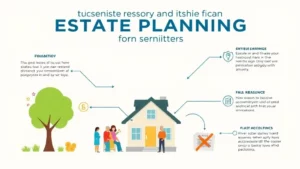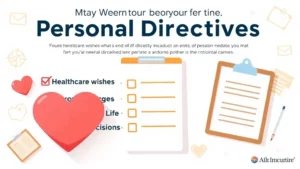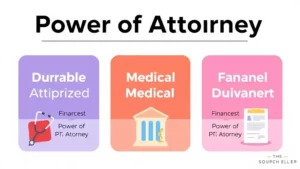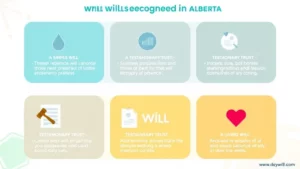
The Complete Guide
Creating an estate plan is one of the most important steps you can take to protect your loved ones and ensure your wishes are respected. This comprehensive guide walks Calgary residents through the essential components of estate planning under Alberta law, providing you with the knowledge to make informed decisions about your future. Whether you’re drafting your first will, updating an existing plan, or curious about enduring powers of attorney and personal directives, we’ve got you covered. We’ll explain key terms and offer practical tips so you can protect your loved ones and reduce future uncertainties.
In This Complete Alberta Estate Planning Guide:
Why Estate Planning Matters for all Albertans
Estate planning isn’t just for the wealthy or elderly—it’s essential for every adult regardless of age, income, or family status. A proper estate plan gives you control over what happens to your possessions, your dependents, and even yourself if you become unable to make decisions.
Without an estate plan, Alberta law will determine:
- Who receives your assets (which may not align with your wishes)
- Who will care for your minor children
- Who will manage your financial affairs if you’re incapacitated
- What medical treatments you’ll receive if you cannot communicate
For Calgary residents, understanding the specific requirements of Alberta legislation is crucial to creating an effective estate plan. Each province has its own legal nuances, and this guide focuses on the documents and steps most relevant here in Alberta.
Key Terms & Definitions for Alberta Estate Planning Guide
A. Beneficiary
A person or organization (e.g., a charity) that receives assets or property from your estate.
B. Codicil
A legal amendment to an existing will. It must follow formalities (signatures, witnesses) similar to a will.
C. Enduring Power of Attorney (EPA)
An official document granting someone the authority to manage your finances and property if you lose capacity. “Enduring” means it continues to be valid even after you’re incapacitated.
D. Estate
Everything you own—properties, investments, savings, personal possessions—plus any liabilities or debts. Your estate is what is managed or distributed upon your death.
E. Executor (Personal Representative)
The individual (or institution) designated to carry out the instructions in your will. They handle funeral arrangements, contact beneficiaries, pay debts, file tax returns, and manage the probate process if needed.
F. Intestacy
When you die without a valid will. In Alberta, the Wills and Succession Act dictates how your estate is distributed, which may not align with your personal wishes.
G. Personal Directive
Also known as a health-care directive in some provinces, this outlines your preferences for health care, living arrangements, and personal care decisions if you become incapable of making them yourself.
H. Will
A legal document specifying how your property and assets (the estate) should be distributed after your death. It can also name guardians for minor children.
Common Mistakes & Pitfalls in Estate Planning
Many Albertans inadvertently make errors that can compromise their estate plans. Being aware of these common pitfalls can help you avoid them.
- Failing to Draft a Will – In Alberta, if you don’t have a will, your estate is subject to Alberta intestacy rules. This can lead to unexpected outcomes, such as estranged family members inheriting or no guardianship clarity for minor children.
- Outdated Documents – Life changes—marriage, divorce, births, deaths, or major financial shifts—can make parts of your will irrelevant or even invalid. Regular updates ensure your plan reflects your current reality.
- Not appointing an Alternate Executor – Executors can decline or be unable to serve. Naming a backup or “alternate” executor prevents legal delays.
- Not Discussing Roles – Executors, attorneys, and agents should know ahead of time that you’re naming them. Surprises can lead to refusal or conflict.
- Unclear or Contradictory Instructions – Vague statements or contradictory bequests (e.g., promising the same property to two different people) can trigger disputes. Precision matters!
- Ignoring Digital Assets – Online bank accounts, social media profiles, digital subscriptions, or even cryptocurrency can be overlooked. Ensure your executor knows how to access and manage these assets legally.
- DIY Documents Without Legal Guidance – While some forms are recognized in Alberta, small drafting errors (like improper witnessing) can cause big legal headaches. Input from a Alberta Law Society regulated Lawyer reduces risk.
- Forgetting to Plan for Incapacity – Wills cover decisions after death, but enduring powers of attorney and personal directives safeguard your financial and healthcare choices if you can’t speak for yourself.
Remember, most of these pitfalls are easily avoidable with careful planning and, when necessary, professional legal guidance.
Step 1: Assess Your Situation and Gather Information for Your Estate
Identify & Value Your Assets
Start by listing and valuing everything you own—home(s), car(s), investments, retirement accounts, collectibles, even digital assets like cryptocurrency wallets. Include intangible assets such as intellectual property if relevant. Also note liabilities—mortgages, loans, lines of credit—to get a complete picture of your net worth.
Why does this matter? Because clarity on your assets helps determine how you wish to distribute them. For instance, if you plan to leave your home to a spouse but also gift money to children, you’ll need an accurate valuation of your property and accounts. This financial snapshot also aids your executor in settling outstanding debts and allocating assets fairly.
It’s not glamorous work, but an organized asset list often prevents confusion, disputes, or missed inheritances down the line.
Pro Tip: Create a spreadsheet or use an estate planning inventory app to track your assets, their approximate values, and any relevant account numbers or documentation. Update this inventory annually or whenever you acquire significant new assets.
Create an Asset Inventory
List all your assets, including:
- Real estate: Home(s), rental properties, vacation cottages.
- Financial accounts: Bank and investment accounts, RRSPs, TFSAs.
- Insurance policies: Life, disability, or critical illness policies.
- Vehicles: Cars, trucks, recreational vehicles.
- Business interests: Shares in a company, partnership stakes.
- Personal valuables: Jewelry, art, collectibles, or items with sentimental value.
- Digital assets: Online accounts (PayPal, e-commerce stores), domain names, cryptocurrencies, photos stored in the cloud.
For each asset, note:
- Approximate value.
- Location or account details.
- Ownership (sole vs. joint).
- Designated beneficiaries, if any.
Consider Your Family Situation
Think about:
- Spouse/partner status.
- Children (including stepchildren or adopted).
- Other dependents (elderly parents, special needs family members).
- Extended family who might be impacted by your estate distribution.
- Any blended family scenarios or unique circumstances (e.g., shared custody).
List Your Debts
Document all outstanding debts:
- Mortgages
- Credit card balances
- Personal or business loans
- Car loans
- Tax liabilities

Step 2: Choose the Right Executor, Attorney and Agent
Your executor—often called a personal representative in Alberta—holds significant responsibility. They must locate and secure assets, communicate with beneficiaries, and sometimes handle probate (the legal process confirming a will’s validity).
Consider someone trustworthy, organized, and financially savvy. A spouse or adult child might be the obvious choice, but don’t overlook potential conflicts of interest or burdens on their time. You can also name multiple co-executors, though that can complicate decision-making.
Think about naming an alternate in case your first choice is unable or unwilling to serve. Some individuals opt for professional trust companies—though they typically charge fees—for complex estates or to avoid tension among family members.
Make sure the executor understands their obligations and is comfortable managing legal and financial details. Your executor should be someone who:
- Lives in or near Calgary (or at least in Alberta) for easier administration
- Is likely to outlive you
- Has the time and capacity to fulfill potentially time-consuming duties
- Can remain neutral in any family disagreements
- Will respect your wishes, even when faced with pressure from others
Remember that serving as an executor is a significant responsibility, so always discuss this role with your potential executor before naming them in your will.
Identify Key People
You’ll need to choose individuals for crucial roles:
- Executor: Administers your estate after death.
- Guardian: Cares for minor children if both parents pass away.
- Attorney: Manages your financial affairs under a Power of Attorney if you’re incapacitated.
- Agent: Makes healthcare decisions on your behalf via a Personal Directive.

Step 3: Create Your Will
Drafting a Valid Will
A will is the cornerstone of your estate plan. It provides instructions for the distribution of your assets after your death and allows you to name an executor and guardians for minor children. In Alberta, specific requirements must be met for your will to be considered legally valid and enforceable.
Legal Requirements for a Valid Will in Alberta
In Alberta, any mentally capable adult over 18 can make a will. The will must be in writing, signed by you (the testator), and witnessed by two individuals who aren’t beneficiaries. If these formalities aren’t met, the document may be deemed invalid.
Holographic wills (handwritten and unwitnessed) can sometimes be recognized, but they often lead to disputes. E-wills or other forms might not meet provincial standards, so be careful following templates found online.
For a will to be valid in Alberta, it must meet these requirements:
- You must be at least 18 years old (with some exceptions for minors in the military or those who are married).
- You must have testamentary capacity (understanding what a will is and its effects).
- The will must be in writing.
- The will must be signed by you at the end.
- Your signature must be witnessed by two people (neither a beneficiary nor spouse of a beneficiary).
- The witnesses must sign in your presence.
Selecting an Executor for Your Will
Your executor (also called a personal representative) will:
- Locate and review your will
- Apply for probate if necessary
- Identify and collect your assets
- Pay your debts and taxes
- Distribute your remaining assets according to your will
When choosing an executor, consider:
- Their trustworthiness and organizational skills
- Their proximity to Calgary (local executors can more easily handle your affairs)
- Their age and health (they should be likely to outlive you)
- Their willingness to take on this responsibility
- Potential conflicts of interest
You may also name co-executors or alternate executors. For complex estates, consider naming a trust company or lawyer as your executor, though that can increase costs.
Naming Guardians for Minor Children
If you have children under 18, your will should name a guardian who will care for them if both parents die before the children reach adulthood.
When selecting a guardian, consider:
- Their values and parenting style
- Their relationship with your children
- Their age and health
- Their location (would your children need to move?)
- Their willingness and ability to take on this responsibility
It’s important to discuss this role with your chosen guardian beforehand. Also consider naming an alternate guardian in case your first choice is unable to serve.
Distribution of Assets of Your Estate
In your will, specify how you’d like your assets distributed:
- Specific Bequests: Items or sums for certain people (e.g., $5,000 to a nephew for education).
- Residual Estate: Anything not covered by specific bequests.
- Contingent Beneficiaries: Who inherits if a primary beneficiary passes away before you.
- Trusts: For minor children or beneficiaries with special needs (or to manage large inheritances until a beneficiary reaches a certain age).
Crafting Clear Bequests
Lay out specific gifts—like sentimental heirlooms or lump-sum amounts—and identify who should receive them. Then address the ‘residue’—everything remaining after debts, taxes, and specific gifts are handled.
Finally, consider naming guardians for minor children and backup guardians if the first choice can’t serve. If you want certain conditions (e.g., a trust for your child until they reach 25), specify those too.
Alberta law allows for flexible arrangements but clarity is key. Avoid vague language that could be interpreted multiple ways. For example, instead of “my jewelry to my daughter,” specify “all jewelry I own at the time of my death to my daughter, Sarah Jane Smith.”
Be mindful of potential conflicts—if you leave your home to one child and financial assets of equivalent value to another, fluctuating real estate or investment markets could create an unintended imbalance.
Special Considerations Under Your Will
Your will should also address:
- Business interests and succession plans
- Pets and their care
- Digital assets (social media accounts, online photos, cryptocurrency)
- Personal items with sentimental but little financial value
- Charitable bequests
Calgary Estate Planning Tip: While do-it-yourself will kits exist, they often lack the customization or legal nuance you need. Having a Calgary-based lawyer draft (or review) your will ensures compliance with Alberta law and helps prevent disputes.
Updating or Replacing Your Will
Use a codicil to modify an existing will, or draft a completely new will that expressly revokes the old one. If you move provinces, get married, divorced, or experience major asset changes, it’s wise to revisit your documents.
Keep signed, updated copies in a secure spot, and inform your executor of their location. In Alberta, marriage no longer automatically revokes a will, but divorce can affect provisions related to your former spouse.
Remember that handwritten changes to a formal will after it has been signed are not valid—even if you initial them. Always follow proper procedures when updating your estate plan.

Step 4: Establish Your Enduring Power of Attorney (EPA)
What is an Enduring Power of Attorney (POA)
An Enduring Power of Attorney (EPA) is a legal document that gives someone you trust the authority to manage your financial and legal affairs if you become mentally incapacitated.
While a will comes into play only after death, an enduring power of attorney (EPA) protects your finances if you become mentally or physically incapable of managing them. For example, if you suffer an accident or develop an illness, your ‘attorney’ (the person you name) steps in to pay bills, handle mortgages, manage investments, and make day-to-day financial decisions. Without an EPA, a court may need to appoint a trustee—a process that can be costly and time-consuming.
When drafting an EPA, be explicit about the scope of authority you grant and any conditions (e.g., ‘Effective only upon my physician declaring me incapacitated’). Make sure the named attorney understands their fiduciary duty to act in your best interest.
Alberta law outlines formalities—like who can witness signatures and how to revoke or amend an EPA. Again, clarity prevents misuse or confusion, so carefully select a trustworthy attorney and consider naming an alternate if the first choice cannot serve.
Types of Powers of Attorney in Alberta
Alberta recognizes several types of Powers of Attorney:
- Immediate Power of Attorney: Takes effect as soon as it’s signed and continues if you become incapacitated
- Springing Power of Attorney: Only takes effect when you become mentally incapacitated (as certified by a doctor)
- Limited Power of Attorney: Gives authority for specific tasks or time periods only
For estate planning purposes, most Calgary residents choose an Enduring Power of Attorney, which can be either immediate or springing.
Choosing Your Attorney under Your Enduring Power of Attorney
Your attorney should be someone who is:
- Trustworthy and responsible
- Good with financial matters
- Likely to outlive you
- Available to handle your affairs (ideally living in or near Calgary)
- Willing to take on this responsibility
You can name multiple attorneys to act jointly (requiring both to agree) or separately. You should also name an alternate attorney in case your first choice cannot serve.
Attorney's Powers to Grant
In your EPA, you can specify what powers your attorney will have. These may include:
- Banking transactions (managing bank/investment accounts)
- Buying or selling property
- Managing investments
- Filing tax returns
- Applying for government benefits
- Paying bills and debts (utilities, mortgage)
- Continuing charitable donations
You can grant broad powers or limit them to specific assets or transactions.
When Your EPA Takes Effect
- Immediate: Your attorney can act right away, even if you’re still capable.
- Springing: They act only if your incapacity is confirmed.
If you choose a springing EPA, you must specify how incapacity will be determined. Typically, this requires one or two doctors to certify in writing that you are mentally incapable of managing your financial affairs.
Duties and Responsibilities of Your Attorney
Your attorney has a legal obligation to:
- Act in your best interest
- Keep your property separate from their own
- Avoid conflicts of interest
- Keep proper records of all transactions
- Act according to your known wishes or in a way that they believe you would want
Calgary Estate Planning Tip: Consider including specific instructions about how you want your finances managed. For example, you might specify what standard of living you wish to maintain, what care facilities you would prefer, or how your investments should be handled. Clear guidelines help your attorney follow your wishes accurately.
Special Considerations Under Your Will
Your will should also address:
- Business interests and succession plans
- Pets and their care
- Digital assets (social media accounts, online photos, cryptocurrency)
- Personal items with sentimental but little financial value
- Charitable bequests
Calgary Estate Planning Tip: While do-it-yourself will kits exist, they often lack the customization or legal nuance you need. Having a Calgary-based lawyer draft (or review) your will ensures compliance with Alberta law and helps prevent disputes.
Updating or Replacing Your Will
Use a codicil to modify an existing will, or draft a completely new will that expressly revokes the old one. If you move provinces, get married, divorced, or experience major asset changes, it’s wise to revisit your documents.
Keep signed, updated copies in a secure spot, and inform your executor of their location. In Alberta, marriage no longer automatically revokes a will, but divorce can affect provisions related to your former spouse.
Remember that handwritten changes to a formal will after it has been signed are not valid—even if you initial them. Always follow proper procedures when updating your estate plan.

Step 5: Create Your Personal Directive
What is a Personal Directive
A Personal Directive (sometimes called a Living Will in other provinces) allows you to appoint someone (your “agent”) to make personal and healthcare decisions for you if you become unable to make these decisions yourself.
A personal directive is your voice for healthcare and personal decisions if you’re unable to communicate. Think of it as covering medical consent, life support choices, living arrangements, and even day-to-day personal care.
While it’s crucial for end-of-life preferences, a personal directive also applies to temporary incapacities—such as severe injury or coma. Alberta’s Personal Directives Act requires you to be at least 18 and mentally competent.
The agent(s) you name must be someone you trust to respect your values and carry out your wishes. You can include specifics—like whether you’d want certain surgeries or palliative care approaches. Or you can give your agent broad discretion to decide what’s best.
Keep a copy of the directive in an accessible place and let loved ones or your doctor know about it. This document seamlessly complements your EPA: one covers finances, the other personal and health decisions. Together, they ensure your voice is heard even if you’re physically or mentally incapacitated.
What a Personal Directive Covers
Unlike a Power of Attorney, which deals with financial matters, a Personal Directive covers decisions about:
- Medical treatments and procedures (e.g., surgeries, medications).
- End-of-life care (life support, resuscitation).
- Living arrangements (home care vs. assisted living).
- Diet, nutrition, or daily routine.
- Visitation rights (who may visit if you’re hospitalized).
- Non-financial legal matters (unrelated to your estate distribution).
- Pain management preferences
- Artificial nutrition and hydration choices
- Organ and tissue donation wishes
- Religious or cultural considerations for your care
Remember that your agent needs to understand not just your specific instructions, but also your values and priorities, to make decisions you would approve of in unforeseen situations.
Choosing Your Agent under Your Personal Directive
Your agent should be someone who:
- Knows you well and understands your values
- Is willing to advocate for your wishes, even in difficult circumstances
- Is likely to be available when needed
- Can make difficult decisions during emotional times
- Is at least 18 years old
You can name multiple agents to act together or alternate agents if your first choice cannot serve.
Expressing Your Healthcare Wishes
Your Personal Directive should clearly state your preferences for medical care, especially for situations like:
- Life-sustaining treatments (e.g., ventilators, feeding tubes)
- Resuscitation efforts
- Pain management
- Organ and tissue donation
- Participation in medical research
Be as specific as possible about your values and priorities. For example, would you prioritize quality of life over longevity? What constitutes an acceptable quality of life for you?
When Your Personal Directive Takes Effect
Your Personal Directive only takes effect when you are determined to lack capacity to make personal decisions. This determination is typically made by a doctor or other healthcare provider, based on your ability to understand information relevant to a decision and appreciate the reasonably foreseeable consequences of that decision.
Legal Requirements in Alberta for Personal Directives
For a Personal Directive to be valid in Alberta:
- You must be at least 18 years old
- You must understand what a Personal Directive is and its effects
- It must be in writing
- It must be dated
- It must be signed by you
- It must be signed by a witness (who is not your agent or agent’s spouse)
Calgary Estate Planning Tip: Discuss your Personal Directive with your doctor and your agent to ensure they understand your wishes. Consider reviewing and updating it every few years or after significant health changes.
Special Considerations Under Your Will
Your will should also address:
- Business interests and succession plans
- Pets and their care
- Digital assets (social media accounts, online photos, cryptocurrency)
- Personal items with sentimental but little financial value
- Charitable bequests
Calgary Estate Planning Tip: While do-it-yourself will kits exist, they often lack the customization or legal nuance you need. Having a Calgary-based lawyer draft (or review) your will ensures compliance with Alberta law and helps prevent disputes.
Updating or Replacing Your Will
Use a codicil to modify an existing will, or draft a completely new will that expressly revokes the old one. If you move provinces, get married, divorced, or experience major asset changes, it’s wise to revisit your documents.
Keep signed, updated copies in a secure spot, and inform your executor of their location. In Alberta, marriage no longer automatically revokes a will, but divorce can affect provisions related to your former spouse.
Remember that handwritten changes to a formal will after it has been signed are not valid—even if you initial them. Always follow proper procedures when updating your estate plan.

Step 6: Finalize and Store Your Estate Planning Documents
Reviewing Your Estate Planning Documents
Before finalizing your estate planning documents, review them carefully to ensure they:
- Accurately reflect your wishes
- Cover all relevant assets, guardianship, and instructions
- Comply with Alberta’s legal requirements for signatures and witnesses.
- Name individuals who have agreed to serve in their roles.
Consider having a qualified Lawyer review your documents, especially if you’ve used DIY methods to create them.
Compliance with Signing Requirements
Ensure all documents are properly signed and witnessed according to Alberta law:
- Will: Signed by you and two witnesses (who are not beneficiaries/executors or spouses of beneficiaries/executors)
- Enduring Power of Attorney: Signed by you and a witness (who is not your attorney or their spouse)
- Personal Directive: Signed by you and a witness (who is not your agent or their spouse)
Choosing Your Agent under Your Personal Directive
Your agent should be someone who:
- Knows you well and understands your values
- Is willing to advocate for your wishes, even in difficult circumstances
- Is likely to be available when needed
- Can make difficult decisions during emotional times
- Is at least 18 years old
You can name multiple agents to act together or alternate agents if your first choice cannot serve.
Storage and Access of Your Estate Planning Documents
All your planning is pointless if nobody can find the documents when needed. Keep your original Will, EPA, and personal directive in a fireproof safe or secure filing system. Some people opt for safety deposit boxes, but ensure your executor and agent can access it without cumbersome procedures.
Provide copies or at least inform trusted family members or friends of the documents’ location. If you use a lawyer, they may store your originals and give you copies.
Also consider whether to register your personal directive with the Alberta Personal Directives Registry so healthcare providers can quickly confirm its existence. Digital backups—while not legally binding in themselves—are helpful references.
The key is accessibility: your executor or agent shouldn’t scramble to locate crucial papers during an already stressful time.
Store your original documents in a secure but accessible location, such as:
- A fireproof home safe
- Your lawyer’s office
- A safety deposit box (ensure someone has access to it)
Tell your executor, attorney, and agent:
- That you’ve named them in your documents
- Where the original documents are stored
- How to access them when needed
Consider providing copies to these individuals and keeping digital copies as backups.
Registration Options
In Alberta, you can register your Personal Directive with the Alberta Personal Directives Registry. This doesn’t store the actual document but records that you have one and provides contact information for healthcare providers who need to access it.

Step 7: Regularly Review and Update Your Estate Planning Documents Over Time
Regular Reviews and Updates to Your Estate Planning Documents
Estate planning isn’t ‘one and done.’ Revisit your plan every few years, or whenever big life events occur—marriage, divorce, a new child, purchasing property, or inheriting a large sum. Even minor updates to beneficiary designations or your chosen executor can stave off confusion.
Keep track of changes in Alberta’s laws, too; while major overhauls are uncommon, it pays to stay informed. If you move from Calgary to another province (or country), check local requirements.
Updates don’t always require rewriting everything; sometimes a codicil or an amendment to your EPA or personal directive is enough. Consistency across documents is essential: you don’t want your will saying one thing while your insurance policy or personal directive implies another.
Review your estate planning documents regularly, especially after:
- Every 3-5 years as a general practice
- Marriage, divorce, or new relationships
- Birth or adoption of children or grandchildren
- Death of a beneficiary, executor, attorney, or agent
- Significant changes in your assets or financial situation
- Moving to a different province or country
- Changes in Alberta estate laws
Calgary Estate Planning Tip: Create an “In Case of Emergency” file with copies of important documents, contact information for your lawyer, financial advisor, doctor, and instructions for your loved ones. Let key people know where to find this file

Additional Considerations and Advanced Topics for Estate Planning
For many Albertans, the basic estate planning documents will suffice. However, some situations call for more specialized planning tools and considerations.
Additional Estate Planning Considerations
Tax Planning
While Canada doesn’t have an inheritance or estate tax, there are still tax implications to consider:
- Your final tax return must be filed
- Registered accounts (RRSPs, RRIFs) are fully taxable on death unless rolled over to a spouse
- Capital gains on non-registered investments will be triggered on death
- Principal residences remain tax-exempt
Consider consulting with a tax professional to implement strategies that minimize tax liability for your estate.
Insurance Planning
Life insurance can be an effective estate planning tool:
- It provides immediate cash to your beneficiaries
- Proceeds are typically tax-free and bypass probate
- It can help cover final expenses, debts, and taxes
- It can create an inheritance or equalize inheritances among children
Review your insurance needs and beneficiary designations as part of your estate plan.
Digital Assets Management
Create a plan for your digital assets:
- List all online accounts, subscriptions, and digital assets
- Document how to access them (consider a password manager)
- Specify what should happen to each account (close, memorialize, transfer)
- Address cryptocurrency and digital investments
Business Succession Planning
If you own a business, your estate plan should address:
- Who will take ownership of your business interests
- Who will manage the business after your death or incapacity
- Buy-sell agreements with business partners
- Funding mechanisms for business transfers
Funeral and Memorial Planning
Consider documenting your preferences for:
- Burial, cremation, or other disposition
- Funeral or memorial service details
- Obituary information
- Charitable donations in lieu of flowers
While these wishes aren’t legally binding in the same way as a will, documenting them can provide guidance and comfort to your loved ones.
Advanced Estate Planning Topics
Trusts
For more complex estates, trusts can manage assets for minors or individuals with special needs, shield assets from certain claims, or reduce taxes. An estate-planning lawyer can advise if a testamentary trust or living trust suits your family.
Trusts can be particularly useful for:
- Providing for children or dependents with disabilities
- Managing inheritances for minors until they reach a certain age
- Protecting assets from creditors
- Potentially reducing probate fees
- Creating a legacy through charitable remainder trusts
Joint Ownership
Joint tenancy with a right of survivorship allows certain assets (like a home) to bypass probate if one owner passes. However, not all accounts or properties should automatically be placed in joint names—missteps can lead to unintended tax or legal consequences.
Before adding someone as a joint owner, consider:
- Potential tax implications for both parties
- Whether you’re unintentionally creating an immediate gift
- Loss of control over the asset
- Exposure to the joint owner’s creditors
- Impact on other estate planning goals
Charitable Gifting
Want to leave part of your estate to a Calgary-based charity or foundation? Specific bequests or residual designations can benefit a cause you care about. This can also lead to tax advantages for your estate.
Consider these approaches:
- Direct bequests of specific amounts or assets
- Percentage designations of your residual estate
- Establishing a donor-advised fund
- Creating a charitable remainder trust
Digital Assets
Beyond social media, consider e-commerce stores, domain names, or digital wallets. Document login credentials securely. Alberta law is evolving on how executors can handle digital content, so thorough instructions help.
Create a digital asset inventory including:
- Email accounts
- Social media profiles
- Online banking and investment accounts
- Subscription services
- Digital photos and documents
- Cryptocurrency wallets and keys
- Websites and domain names
Cross-Border or International Issues
If you own property outside Alberta or have dual citizenship, cross-border estate planning gets more complicated. Seek specialized advice to ensure compliance with multiple jurisdictions.
International considerations may include:
- Foreign property ownership
- Taxation in multiple countries
- Recognition of your will in other jurisdictions
- Currency conversion issues
- International probate requirements
Your Estate Planning Checklist
Use this handy list to ensure you haven’t missed anything:
Essential Documents
Will (named executor and guardians)
Enduring Power of Attorney (financial/ legal)
Personal Directive (health/personal care)
Key Decisions
Named executor(s) and alternate(s)
Named guardian(s) for minor children and alternate(s)
Named attorney(s) for Power of Attorney and alternate(s)
Named agent(s) for Personal Directive and alternate(s)
Outlined asset distribution (specific gifts, residual estate)
Documented healthcare preferences (life support, organ donation, etc.)
Important Tasks
Created an inventory of assets (with approximate values)
Compiled a list of debts/liabilities
Reviewed beneficiary designations on insurance and RRSPs
Stored documents securely and gave instructions to key people
Created an “In Case of Emergency” file with copies and contact info
Scheduled regular reviews of your plan
For a simplified one-page reference, feel free to create a printable version for your personal records.
Looking for Estate Planning Advice from our Recommended Estate Planning Lawyer in Calgary?
While WillsCalgary.ca is an educational platform, sometimes you need direct legal expertise. If you need a legally drafted will or personalized legal advice, consider reaching out to our recommended Estate Planning Lawyer in Calgary.

Explore More Alberta Estate Planning Insights on our Blog
Stay informed with our latest articles on estate planning topics relevant to Calgarians and all Alberta residents. Our blog covers everything from basic concepts to advanced strategies and legislative updates.
Estate Planning for Seniors in Calgary
This article provides specific advice for seniors in Calgary regarding estate planning, focusing on the
Personal Directives: Expressing Your Wishes in Alberta
This article explores the role of personal directives in Alberta, emphasizing the importance of expressing
Power of Attorney: Protecting Your Interests in Calgary
This article explains the importance of power of attorney in Calgary, outlining the different types
Understanding Alberta’s Wills and Estate Planning Laws
This article provides a comprehensive overview of Alberta’s estate planning laws, focusing on the importance




